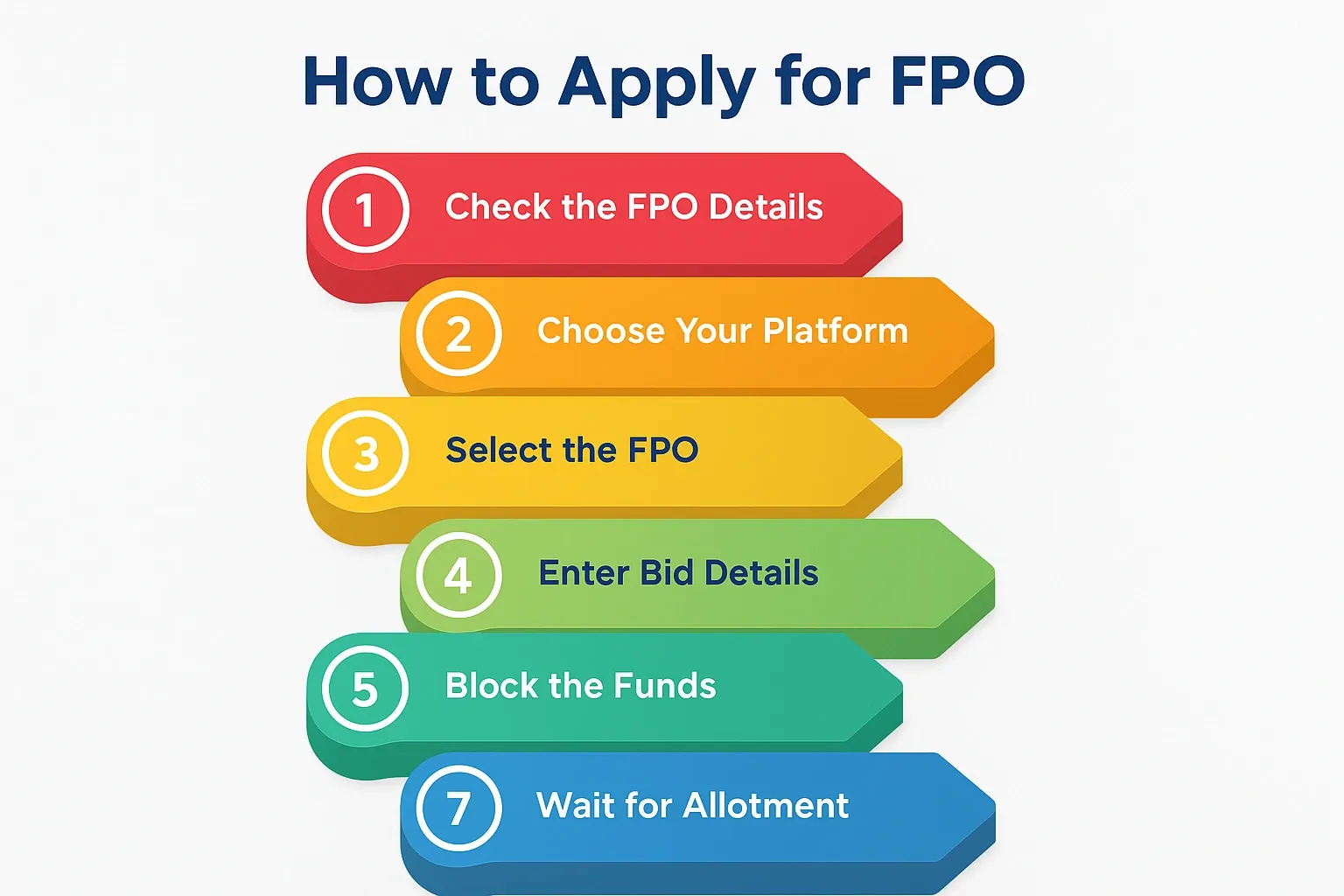What is FPO?

- Published Date: July 27, 2023
- Updated Date: November 18, 2025
- By Team Choice
When exploring the stock market, you must have come across terms like IPO and FPO. While IPOs are widely known, FPOs are just as important for both companies and investors. This blog covers the meaning of FPO, its types, how it works, the key advantages & disadvantages, and the process of applying for one.
FPO Full-Form:
The FPO full form in the share market is Follow-On Public Offer.
As the name suggests, FPO happens after a company’s initial public offering. Now that we know what FPO stands for, let’s understand its meaning in detail.
FPO Meaning
An FPO (Follow-On Public Offering) happens when a company that’s already listed on the stocks exchange issue additional shares to the public, thereby increasing the number of shares available for trading in the stock market. The primary reason a company announces an FPO is to raise additional funds for capital acquisition, repay debts, expand operations, or fulfill other business requirements.
Open a FREE Demat Account in 5 Mins.
- Free AMC for First Year
- Low DP Charges (₹ 10)
- No Auto Square Off Charges
- Free Research Calls
Types of FPOs
There are mainly three ways a company can issue an FPO:
1. Dilutive FPO:
A Dilutive follow-on public offering occurs when a company’s directors decide to issue new shares to the public. As these are fresh shares issued after the company’s IPO, the total number of outstanding shares in the market increases.
This type of FPO is known as ‘Dilutive’ because the ownership of existing shareholders gets diluted because their percentage holding decreases with the increase in total shares.
Reasons why the company issues new shares:
- To raise additional funds for the business expansion, finance acquisitions, or new ventures.
- To repay existing debts and strengthen the company’s balance sheet.
- To improve the liquidity of shares in the market.
This dilution reduces the earnings per share (EPS). Though the current market price and EPS decrease, investors often view this as a positive sign if the company uses the additional funds for growth and expansion.
2. Non-Dilutive FPO:
A Non-Dilutive follow-on public offering occurs when existing shareholders, promoters, or early investors sell their shares to the public. In this case, no new shares are issued. The funds raised from the non-dilutive FPO are not used for the company’s operation; instead, the money goes to the selling shareholders.
There’s no dilution in this kind of FPO. The total number of shares remains the same, but ownership transfers from existing investors to new ones.
Why Companies Use It:
- To increase the liquidity of shares in the market.
- To allow promoters or early investors to sell a portion of their holdings.
- To build more trust in the company by showing transparency and the availability of shares.
Non-dilutive FPOs provide retail investors with an opportunity to buy shares from established promoters or institutional investors.
3. At-the-Market Offering:
An At-the-Market (ATM) Offering is a special type of Follow-on Public Offer (FPO) where a listed company issues and sells new shares directly into the open market at the prevailing market price, rather than setting a fixed price or price band in advance.
Unlike a traditional FPO, where shares are offered in bulk during a specific subscription window, an ATM offering allows the company to sell shares gradually, over time, depending on market conditions.
Why Companies Use ATM Offering?
- To raise capital without heavily impacting the share price.
- To take advantage of favourable market conditions.
- To maintain financial flexibility and fund ongoing needs, such as working capital, debt repayment, or expansion.
For investors, an ATM offering usually causes less disruption than a large, dilutive FPO because shares enter the market slowly. However, since shares are being added to the supply, there could still be mild dilution over time.
How Does a Follow-on Public Offering (FPO) Work?
An FPO follows a structured step-by-step process to ensure compliance with SEBI guidelines and maintain transparency for investors.
Here’s how the process generally unfolds:
1. Board Approval: A company’s board of directors first has to approve raising capital via a follow-on public offering (FPO). The company is required to finalise key details such as the total number of shares to be issued, the type of FPO to go with, and how the raised funds will be used.
2. Appointment of Intermediaries: Once the decision is approved, the company has to bring in key market participants such as investment banks, underwriters, registrars, and legal advisors. These intermediaries are brought in to draft the offer documents, setting the price, and marketing the issue to potential investors.
3. Regulatory Filing: The intermediaries are then required to prepare, draft, and submit important documents such as the Draft Red Herring Prospectus (DRHP) to SEBI. The documents provided cover the company’s financial performance, business operations, potential risks, and the exact purpose of raising funds.
4. Pricing of Shares: After the draft prospectus is filed, the company is required to decide the price mechanism:
- Fixed Price Method - A specific issue price is set.
- Book Building (Price Band) Method - A range is provided, and investors bid within that band.
The final price is determined based on demand.
5. Subscription Window: The company announces the FPO timeline through a press release, including subscription dates, allotment date, credit of shares, and listing date. The subscription window usually remains open for three days, during which retail investors, high-net-worth individuals (HNIs), and institutional investors can apply.
6. Allotment of Shares: Once the subscription closes, the registrar publishes the allotment status, generally within one working day. Allotments are done transparently, and in cases of oversubscription, shares are often distributed through a lottery system.
7. Credit of Shares: If investors receive an allotment, the shares are transferred directly to their Demat account. This usually happens a day before the official listing.
8. Listing and Trading: On the listing day, the new shares are admitted to trading on the stock exchange. Investors who have been allotted shares can choose to hold them or sell at the current market price (CMP) through their broker.
Advantages & Disadvantages of an FPO
An FPO provides several benefits to companies as well as investors; it also comes with certain drawbacks. Let’s understand both to make informed decisions before participating:
Advantages for Companies:
- Raising Additional Capital: Companies can secure funds for expansion, acquisitions, research, or debt repayment.
- Lower Risk of Mispricing: Since the company is already listed, market performance provides a fair benchmark for pricing new shares.
- Improved Liquidity: Issuing more shares increases the number of tradable shares in the market, enhancing liquidity.
- Enhanced Credibility: A successful FPO can signal strong investor confidence in the company’s growth story.
Advantages For Investors:
- Transparency: Unlike IPOs, companies issuing FPOs are already listed and have publicly available financial records, making it easier to evaluate them.
- Lower Risk: Investors can review historical performance and governance standards before investing.
- Opportunity to Invest More: Existing shareholders can increase their stake, while new investors get a chance to enter at regulated prices.
Disadvantages of FPO:
For Companies:
- Dilution of Ownership: In the case of a dilutive FPO, issuing fresh shares reduces the ownership percentage of existing shareholders.
- Market Perception Issues: Frequent reliance on FPOs for capital may raise concerns about the company’s financial health.
- Regulatory Burden: Preparing offer documents, regulatory approvals, and compliance can be time-consuming and expensive.
For Investors:
- Earnings Dilution: When more shares are issued, earnings per share (EPS) may decrease, which can impact future valuations.
- Price Pressure: An increase in the number of shares can put short-term downward pressure on the stock price.
- Uncertain Prospects: If the funds raised are not used efficiently, the expected benefits of the FPO may not materialise for investors.
How to Apply for FPO?

Applying for a Follow-on Public Offer (FPO) is quite similar to applying for an IPO. Investors can participate through their stockbroker or directly via the ASBA (Application Supported by Blocked Amount) facility offered by banks.
Here’s a step-by-step guide:
Step 1: Check the FPO Details:
Stay updated with the company’s official announcement or your broker’s platform to know the FPO timeline, subscription dates, price band, and lot size.
Step 2: Choose Your Platform:
You can apply through:
- Brokerage apps/websites
- Net banking/ASBA facility provided by your bank
Step 3: Select the FPO:
Log in to your chosen platform, go to the IPO/FPO section, and select the ongoing FPO you want to apply for.
Step 4: Enter Bid Details:
Enter the number of shares you wish to apply for (in multiples of the lot size). You can bid at the cut-off price (set by the company after the bidding period) or within the announced price range.
Step 5: Block the Funds:
When you apply, the required amount gets “blocked” in your bank account. The money is not debited immediately; it remains on hold until the allotment process is completed.
Step 6: Wait for Allotment:
After the subscription period closes, the registrar announces allotment status (usually within a day). If shares are allotted, they will be credited directly to your Demat account.
Step 7: Trading on Listing Day:
Once the FPO shares are listed on the exchange, you can either hold them for long-term investment or sell them at the current market price.
Why are the Factors That Impact the FPO?
Factors impacting a Follow on Public Offer (FPO) are crucial for both the issuing company and potential investors. Below are five key factors:
1. Market Conditions
The stock market's overall state can significantly influence an FPO's success. In a bullish market, investors are generally more optimistic and willing to invest, leading to higher demand for new shares. Conversely, investors may be more cautious in a bearish market, resulting in lower demand and potentially less favourable pricing for the issuing company.
2. Company Performance
The financial health and performance of the issuing company play a vital role in attracting investors. Companies with strong earnings, consistent growth, and a solid track record are more likely to instil confidence in potential investors. Positive financial metrics and future growth prospects can make the FPO more appealing.
3. Pricing Strategy
The price at which the new shares are offered is critical to the success of the FPO. If the shares are priced too high, they may not attract enough investors, leading to undersubscription. On the other hand, if the shares are priced too low, the company might not raise the desired capital and could be perceived as undervaluing itself. Striking the right balance is essential to ensure adequate demand and fair valuation.
4. Investor Sentiment
The general mood and perception of investors towards the company and its industry can impact the FPO. Positive sentiment, driven by favourable news, industry trends, or strong company performance, can lead to higher demand for shares. Conversely, negative sentiment, possibly due to industry downturns or adverse news, can deter investors and affect the FPO’s success.
5. Regulatory Environment
Changes in regulations and compliance requirements can affect the timing and success of an FPO. Favourable regulations, such as tax incentives or streamlined approval processes, can facilitate a smoother and more attractive offering. However, stringent rules, increased compliance costs, or regulatory uncertainties can pose challenges and potentially delay or hinder the FPO process.
Why is FPO Important for Investors?
A Follow on Public Offer (FPO) is important for investors as it provides an opportunity to invest in a company they believe in and potentially benefit from its growth. Below are five key reasons why FPOs are significant for investors:
1. Investment Opportunity
FPOs allow investors to purchase additional shares of a company they already trust or are interested in. This can be a chance to increase their stake in a promising company.
2. Price Advantage
Shares in an FPO are often offered at a discount to the current market price. This can provide investors with an opportunity to buy shares at a lower cost, potentially leading to higher returns if the company’s stock price increases.
3. Liquidity
FPOs can enhance the liquidity of a company’s shares by increasing the number of shares available in the market. This can make it easier for investors to buy and sell shares, improving market efficiency.
4. Company Growth
The funds raised through an FPO are typically used for expansion, debt reduction, or other growth initiatives. By participating in an FPO, investors can support the company’s growth plans and potentially benefit from its future success.
5. Market Confidence
A successful FPO can signal strong market confidence in the company. This can attract more investors and positively impact the company’s stock price, benefiting existing and new shareholders.
How do Companies Issue FPO?
Companies issue Follow-on Public Offers (FPOs) to raise additional capital from the public after their initial public offering (IPO). Here's a detailed breakdown of the process:
1. Need Assessment
The company evaluates its financial requirements, identifying the need for additional capital. This could be for new projects, expansion, debt repayment, or increasing working capital to support business operations and growth.
2. Regulatory Approval
The company must secure approval from regulatory bodies like SEBI in India. This involves submitting detailed documentation, including financial statements, business plans, and compliance with legal requirements to ensure transparency and investor protection.
3. Price Band
In collaboration with underwriters, the company sets a price band for the FPO. This range allows investors to bid for shares within a specified limit, balancing market demand and the company’s valuation expectations.
4. Offer Period
The FPO is open for a designated period, typically a few days to a week. During this time, investors can submit their applications to purchase shares, providing an opportunity for a broad range of investors to participate.
5. Allotment
After the offer period closes, shares are allocated to investors based on their bids. The allotment process ensures fair distribution, often prioritising retail investors, institutional buyers, and other categories as per regulatory guidelines.
6. Listing
The newly issued shares are listed on the stock exchange, making them available for trading. This step enhances liquidity and allows investors to buy and sell the shares in the open market, contributing to the company’s market capitalisation.
7. Utilisation of Funds
The company deploys the funds raised from the FPO according to the objectives outlined in the need assessment. This could include project financing, debt reduction, or other strategic initiatives to enhance business operations and growth.
8. Performance Monitoring
The company continuously monitors the impact of the raised funds on its financial health and operations. This involves tracking key performance indicators, ensuring the funds are used effectively, and providing regular updates to stakeholders.
Wrapping Up
To sum up, FPO in the share market is a way for listed companies to raise additional funds by offering more shares. Unlike an IPO, which introduces a company to the stock market, FPOs offer investors the opportunity to invest in already listed businesses with established performance records. However, both are essential fundraising tools, but as an investor, evaluating the company’s purpose, financial health, and growth plans is key before investing.
FAQ
Is there any difference between FPO and IPO?
Yes, there is a huge difference between FPO and IPO, and they function differently in the stock.
Recommended for you

Mutual Fund Returns

FII DII Data - Live Data

Share Market Prediction For Tomorrow
